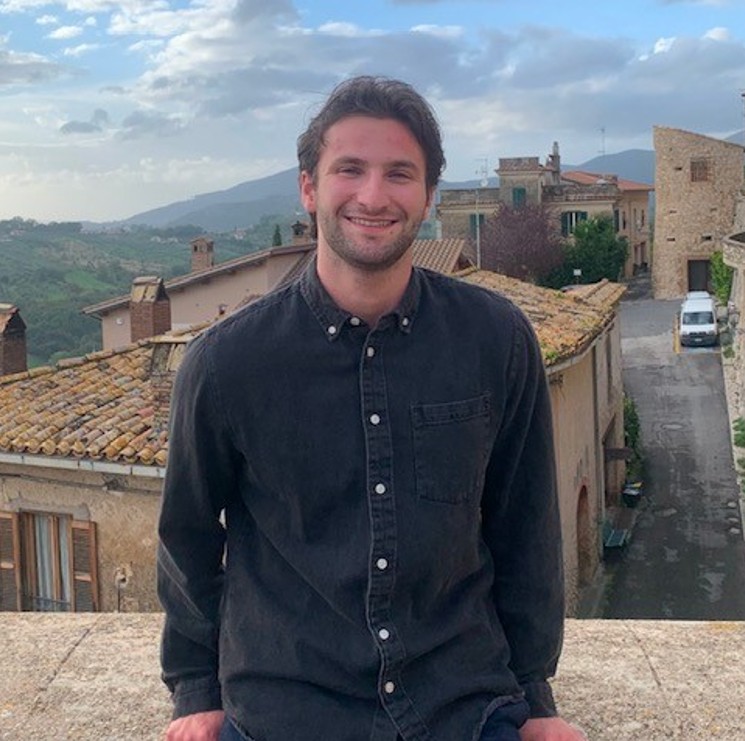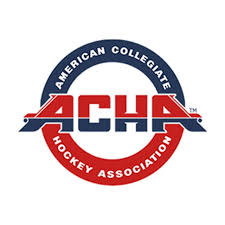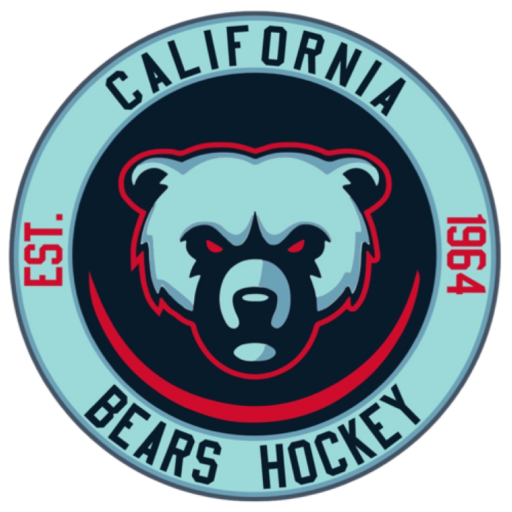Coming Full Circle…
- By John Harrington
After playing two Bantam seasons with the Bears, Miles Brodey (2003) started to focus on prep schools back east for the 2018/2019 season. That year was the maiden voyage for many Bears players as the prep school pipeline recently opened through Coach Torsson’s Prep Camps at Pickwick. Miles was considering Kent, Brooks and Groton. Brooks was his first choice, and it appeared likely he would be going there. However, he made a last-minute decision to go to Lawrenceville without even visiting the campus. It was a tough call as his good friend and teammate was going to Brooks, and he felt a meaningful connection with their Coach and Admissions Officer. But Miles was sold on Lawrenceville’s academics, and its proximity to New York where his mother frequently travelled for work. He reclassified, repeated his freshman year (something he suggests young hockey players do) and quickly moved from the JV team to the Varsity team as a defenseman. Everything was going smoothly with grades, hockey and life on and off campus (Lawrenceville, close to Princeton, is not your typical isolated prep school far from civilization). He was living his dream. Everything was falling into place.
But during his sophomore season, Miles started to feel unusually tired and lethargic. He was also having a little difficulty breathing. But he chalked up these symptoms to asthma and the grind of the student-athlete. It then caught up to him. On a weekend road trip to Massachusetts, he was playing a bone chilling game against the highly ranked Northfield Mount Hermon on their “outdoor” rink (it actually has a roof, but no walls). It was teeth rattling cold. His calves began to tighten and became extremely sore. But Miles played on through the pain. In the locker room, after the game, the pain was excruciating, but again he toughed it out for the five hour drive home to Lawrenceville. The next morning, he could barely walk to the Health Center on campus, and it was at that point his Coach decided to take him to the local hospital. They ran some tests and found blood clots.
Miles reflected on this soul shattering diagnosis, “When you find this out you still don't understand how serious it is. And you don’t know what the timetable is for possible returning to the team. My mom is freaked out, so she flies out, and I end up going to the Children's Hospital in Philadelphia to get things further checked. They find that the blood clots ended up being in both my legs. I also had a lot of pulmonary embolisms which was causing that breathing problems. So, it was a super intense thing. Luckily there was a lot of support. And even the person who helped us out at Children's Hospital still texts my mom for Christmas to this day.”
It was clear the season was over for Miles. However, it coincided with Covid, which ended the season for everyone. This made Miles feel a little better as he began his rehab, and a three-month regime of blood thinners. This regime eventually turned into eight months. The doctors could not determine the cause of the blood clots which Miles came to learn is a mysterious condition. There are very few answers or research on the subject. Because of New Jerseys tight rule on indoor sports during Covid, hockey was cancelled. Miles wanting to stay active. He went outside and played for the baseball team and had an amazing season.
“I've always been decent at baseball, but I kind of had a fluke season. I made First Team All-New Jersey. Fast forward to my senior season and it did not go well at all. It was a little bit of a fluke. I got all these clutch moments. And I'm not really sure where it's going with hockey, so I start looking into college baseball more, because I just didn't know what I wanted to do. So, I have that whole summer training and doing camps. Then I do this one workout that I got from our guy at Lawrenceville, and I get home from the gym, and my arm starts having this weird swelling. I end up going to the hospital and they find a blood clot in my arm. It was explained that this doesn't really connect to the other blood clots in my legs. Unrelated. This is something called thoracic outlet syndrome. This is when you're born with your top rib extending too far into your shoulder.”
At this point, it is the summer before Miles senior year, and he needs surgery to remove half of his rib. School is beginning and his return to hockey and baseball is now over. “It was really frustrating. I couldn't lift anything, but still kind of had a hope that maybe I could have a chance to play hockey. And then at a certain point I had to come to terms with that it wasn't going to happen. So, I fully focused on baseball. And I felt like I was healing enough to play in that baseball season. And it was fine. I didn't feel perfect. But I was still around all my best friends from the hockey team. So, this totally changed the trajectory of where I thought I was going. I definitely wouldn't have gone to D1 hockey. I don't know if I would have wanted to play Juniors and try D3, but I think regardless I probably would have ended up in college on the East Coast.”
Listening to Miles reflect, I got the sense he was hockey purgatory. He could still see, hear, and feel the game, hanging out with his hockey friends, but he could not play the sport he loved. He tried to fill that void with baseball. And that door closed on him as well.
I asked him how he got over these dark days. “I think as it related to hockey, at a certain point I kind of had to separate myself from it, which is why I didn't escape from it for so long. Obviously I was still really tight with all my hockey friends, who are my best friends, and I would support them. But it was tough to be involved, especially I didn't want to be skating or thinking about hockey in any way. That’s when it changed for me. It happened in my senior year; I realized that l need to start finding other things. I played guitar growing up from 8-12 years old, like really passionate about it. But once sports started getting more serious, I just kind of lost passion and stopped playing forever. And then my senior year during the fall I'd started listening to real music again, like Blues and that kind of older stuff. This was the music I would listen to on the way to hockey practice. I can't keep on listening to all this music that I'm feeling really connected to, and also not playing along with it on my guitar. I ended up picking the guitar back up again. And it was a nervous experience. I didn't know how it was going to go. And it just felt weird, especially having some experience, but also feeling like a total beginner again in some sense. I played guitar that senior year, but it wasn't anything too crazy. And then I got home that summer and totally fell in love with it again. I was playing five hours a day. And totally back in it. That ended up being the spark I needed to find out the other things that brought me joy”
Another passion Miles reconnected with was cooking which he gain appreciation through his stepdad who is a chef. He expressed how it is important not to become one-dimensional as an athlete. To keep connected to other interests and passions. “But I think I got lucky with guitar from my life and then that kind of set off a series of events to me finding other things I am passionate about. And then over time I opened back up to hockey again. And I went and skated one time with all these guys from the Bears, a lot of us now aren't playing anymore, which made me more comfortable getting back into it. And it was so wholesome to be back with everyone. And then that got me watching hockey again. And now I'm fully OK with the game. And I feel like I'm kind of coming full circle.”
What’s unique about Miles is the obstacle that got in the way of his dream was not a hockey related injury, but a mysterious blood clot that essentially came out of nowhere. At least with an injury earned on the ice in battle, one can point to the cause or the reason. But when something blind sides you out of nowhere (twice!) it takes some serious soul searching to adapt and overcome. Painful experiences like this test one’s true character. Miles pivoted once, from hockey to baseball, now he needed to find another outlet. And that outlet was a passion he had as a kid. Music. And through reconnecting with the guitar, he became aware of the other joys in his life such as cooking. This process brought him back to hockey, which is bigger than just a game, but a brotherhood. It’s the stuff that’s said on the bench, the zingers in the locker room, the laughs in the parking lot. These relationships transcend the game. Many alumni have said, make sure you have other interests and hobbies. Don’t be “one-dimensional” as Mile strongly suggests.
Miles is now studying Environmental Policy at Claremont McKenna College just outside of L.A. and is a short drive from his home. He wanted to share that the Claremont College system is the best kept secret in the community. If you don’t continue playing hockey after prep school and are not interested in coming home to the giant UC system, you don’t have find a small college back east. The Claremont colleges have small campuses and a close student body, where everybody knows everybody, and gives one the feel of the intimate prep schools back east. There are many attractive programs to suit your career path. And of course, the sunshine if free!
I interviewed Miles as he was driving to Mammoth for a few days. He was so honest, giving and sincere on his hockey journey. As he says, it wasn’t perfect, and after hearing his story, I can sense this has made him a stronger man. When he shared his story about his guitar, I couldn’t help but think of the great quote by Thomas Beecham “The function of music is to release us from the tyranny of conscious thought.” Music, along with a myriad of passions/interest can invoke nostalgia, energy, and euphoria. It can also help people recognize and connect with their emotions.
Don’t be one dimensional…
Why hockey? (TEN WORDS OR LESS)
A collective team environment unlike any other sport.
When and where did you start playing hockey? Who inspired you to play?
I tried skating once when I was 5 at the old Pasadena ice rink, and I absolutely hated it. because I wasn’t immediately good at it. It wasn’t until a year later that I vividly remember my mom walking into the kitchen while I was sitting on the couch and saying, “Guess what starts tomorrow… The NHL season.” I watched a couple of games during the start of the season and was determined to try skating again. I then transitioned to some hockey lessons at Burbank and began my career with the Pasadena Maple Leafs when I was 7. I remember the dad of my neighbor, Charlie Cocuzzo, who also played for the Leafs, and later the Bears, handing me a contract to sign in the old, rundown, Pasadena ice rink lobby. Neither of my parents played hockey, but my dad was always a big Kings fan, so going to games with him at a young age got me inspired. However, hockey was just something that I naturally fell in love with, and fortunately, I had parents who were able to support my passion.
Best Bear Memory?
I played at the Bears for two seasons (Bantam A and Bantam AA). Looking back, I wish that I had transitioned over from the Maple Leafs earlier. It’s kind of impossible to choose my best Bear’s memory. Some that come to mind are – going to China, going to Sweden, nationals in Buffalo, winning this one tournament in Vegas, or our pregame warmups with the Jerry Rangel, the dad of one of our players (Johnny Rangel). I honestly think the pregame warmups during my Bantam AA year are my favorite memories. One that comes to mind is when we were playing that team that we greatly outmatched, so Jerry made us do a very intense workout for our “warmup”. Normally, we’d do a somewhat structured warm-up, and I feel nostalgic to look back at all the different settings that we did this warmup.
Nickname among your hockey friends?
Nothing special, usually just calling me by my last name. One funny thing though is that this carried over to my school friends (Middle school in California and high school in New Jersey). The other day, I saw a big group of people from my childhood, some of whom I hadn’t seen in probably 8 years, and a bunch of them still called me Brodey, which I thought was hilarious.
Which coach/mentor/role model stays with you, to this day, in the back of your mind?
I think Peter is still the mentor who strongly impacted my hockey career, but most importantly gave me lessons/tools that have helped me even after hockey. Peter pushed us, unlike any coach I ever had, while also cultivating a family environment within our team and the Bears community as a whole. Peter taught me a new meaning of hard work that stayed with me during and after my hockey career. One funny moment was during our Labor Day tournament in Arizona during my Bantam A year. We were in Arizona and beat this team by 4 or 5 goals, but Peter felt that we still played poorly, so he made us run suicide sprints in the parking lot in our full gear (minus skates and helmets) for like 45 minutes.
How did you balance studying, commuting, practice, and lots of missed school days?
I was either playing hockey or studying. There were pros and cons to that, but it allowed me to focus on the two activities that were most important in my life. We’d often carpool to tournaments in Northern California or out of state, and we’d all do homework in the car. During our Bantam AA year when we were applying to prep school and studying for the SSAT, we’d do vocabulary study sessions in the car on the way to San Jose (where we played probably 7 times that year). Peter and Paul Kaplan also set our team up with a tutor who would do group study sessions with us over Zoom. We’d sometimes do these sessions after practice in Burbank, or while we were on the road (for example between games in San Jose).
Which exercise gives you the biggest advantage on the ice?
Agility exercises and playing other sports.
Where are you playing now and how did you get there?
I only play for fun now. After my hockey career ended due to injury/health complications, it took me a long time to open back up to hockey. It wasn’t until winter break of last year that I got back on the ice for the first time in probably 3 years.
Where do you see yourself in ten years?
Probably living in California. I think I’ll try out somewhere on the East Coast right after I graduate (maybe Boston or New York), but I want to end up in Southern California.
Best celebrity sighting at Pickwick Ice in Burbank? If not at Pickwick, any other rink in L.A.?
Seeing PK Subban training at Valley Ice Center.
The longest drive you/parents made for a hockey game?
8 hours to Vacaville.
Favorite hockey slang that confuses your civilian friends?
Duster.
You have a Bears Time Machine, you fly back to your first day of Mites, what advice would you give yourself?
Savor the early morning games and practices.
Look at your phone, what is the very last song you listened to? Be honest! No reason or apology is necessary.
Good Times Bad Times.
Any real-world experience, which made you think “Yes, that’s just like in hockey.” What did you learn from your hockey life, which has helped you in the real world?
The lessons I learned related to team dynamics have helped me tremendously with internships and job interviews. I always look at a company, or a certain department of the company, as a team. For me, hockey helped me understand the importance of a collectively passionate environment. There is one particular type of experience that I’ve seen directly translate directly from hockey. It’s the importance of cultivating an open environment where constructive criticism can be accepted by anyone, regardless of if that criticism is coming from a player who may not be as good as the player being “criticized”. Hockey taught me how to navigate these situations because I never was the best or most skilled player, and it also taught me the team qualities and dynamics that are required to create this open environment where everyone has a voice. |



